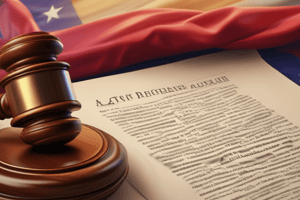Podcast
Questions and Answers
What is prior restraint?
What is prior restraint?
- Censorship that occurs in advance of publication (correct)
- Censorship after publication
- An amendment to the Constitution
- A type of legal trial
What does John Milton argue in Areopagitica?
What does John Milton argue in Areopagitica?
He argues against prior restraint and suggests that good and evil ideas should 'fight it out'.
Framer's intent refers to whether the framers intended to include prior restraint in the First Amendment of the Constitution.
Framer's intent refers to whether the framers intended to include prior restraint in the First Amendment of the Constitution.
True (A)
One argument against prior restraint is that it privileges the government over _______.
One argument against prior restraint is that it privileges the government over _______.
What does risk aversion mean in the context of prior restraint?
What does risk aversion mean in the context of prior restraint?
What does the Brandenburg Test require for 'fighting words'?
What does the Brandenburg Test require for 'fighting words'?
What must a government prove to overcome the presumption of unconstitutionality regarding prior restraint?
What must a government prove to overcome the presumption of unconstitutionality regarding prior restraint?
What did Nebraska Press Association v. Stuart establish?
What did Nebraska Press Association v. Stuart establish?
What are Temporary Restraining Orders (TROs) used for?
What are Temporary Restraining Orders (TROs) used for?
What case established limits of prior restraints on the press?
What case established limits of prior restraints on the press?
The ruling in Near v. Minnesota stated that prior restraints are almost always unconstitutional under the First Amendment.
The ruling in Near v. Minnesota stated that prior restraints are almost always unconstitutional under the First Amendment.
What are the three exceptions to the ruling in Near?
What are the three exceptions to the ruling in Near?
What was the issue regarding the Pentagon Papers case?
What was the issue regarding the Pentagon Papers case?
In national security cases, the government needs to prove that publication will provide 'direct, immediate and irreparable harm'.
In national security cases, the government needs to prove that publication will provide 'direct, immediate and irreparable harm'.
What must be shown to justify a gag order in Nebraska Press Assn. v. Stuart?
What must be shown to justify a gag order in Nebraska Press Assn. v. Stuart?
Match the following issues with their corresponding cases:
Match the following issues with their corresponding cases:
What are some other means of providing fair trials?
What are some other means of providing fair trials?
Flashcards are hidden until you start studying
Study Notes
Prior Restraint Overview
- Prior restraint refers to censorship imposed in advance of publication, often involving government review of all proposed content.
- Historically linked to the belief that unchecked speech can lead to harmful consequences.
Key Figures and Arguments
- John Milton's "Areopagitica" argued against prior restraint, advocating for the open exchange of ideas.
- The concept of framer's intent considers whether the Constitution's framers intended to include prior restraint prohibitions in the First Amendment.
Consequences of Prior Restraint
- Censorship advantages government authority over individual freedoms, potentially fostering civil unrest.
- A lack of information hinders citizens' ability to govern themselves effectively.
Legal Framework and Tests
- Risk aversion in prior restraint reflects the government’s attempt to prevent potential harm from yet-uttered speech.
- The Brandenburg Test addresses the criteria for 'fighting words': intent to incite imminent lawless action that is likely to occur.
Constitutional Standards
- To challenge the presumption of unconstitutionality, the government must show:
- Serious and imminent danger posed by speech.
- That prior restraint effectively mitigates this danger without alternatives.
- The restraint must be narrowly tailored and neither vague nor overly broad.
Landmark Cases
- Nebraska Press Association v. Stuart: Affirmed that courts must utilize the least restrictive means to ensure a fair trial, treating gag orders as a last resort.
- Near v. Minnesota: Established that prior restraints on the press are almost always unconstitutional, with limited exceptions for national security, obscenity, and incitement to lawlessness.
Near v. Minnesota Details
- The case involved Jay Near, charged with publishing defamatory reports, raising the issue of constitutional prior restraint under the 1st and 14th Amendments.
- The ruling reinforced the constitutional protection against prior restraints, with three exceptions detailed for publication types.
Pentagon Papers Case
- The Pentagon Papers case involved the government seeking an injunction against media publications of classified documents, questioning whether the injunction was a First Amendment violation.
- The ruling emphasized the presumption of unconstitutionality for prior restraint, placing the burden of proof on the government.
Nebraska Press Association v. Stuart Analysis
- Examined a gag order in a murder case's pretrial hearing, determining it violated the First and Fourteenth Amendments.
- The ruling established guidelines requiring clear and present danger to justify gag orders, alongside a thorough consideration of alternative measures to ensure a fair trial.
Alternative Fair Trial Measures
- Judges must evaluate other options like jury sequestration, changing trial venues, and other methods to protect defendants' rights without resorting to gag orders.
Studying That Suits You
Use AI to generate personalized quizzes and flashcards to suit your learning preferences.




